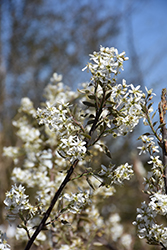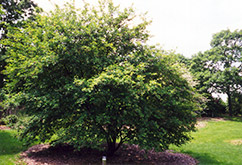It's all about ...
plants

Hybrid Serviceberry
Amelanchier x grandiflora
Height: 25 feet
Spread: 20 feet
Sunlight:
![]()
![]()
Hardiness Zone: 3a
Other Names: Apple Serviceberry, Amelanchier arborea x laevis
Description:
A great large shrub or small tree prized for its abundance of showy, fragrant white flowers in spring, and consistently beautiful fall color; berries can be eaten raw or used to make pies or preserves; a perfect shade tree for small landscapes
Ornamental Features
Hybrid Serviceberry is covered in stunning clusters of fragrant white flowers rising above the foliage in early spring, which emerge from distinctive pink flower buds before the leaves. It has dark green deciduous foliage which emerges coppery-bronze in spring. The oval leaves turn outstanding shades of orange, red and burgundy in the fall. It produces blue berries from late spring to mid summer. The furrowed gray bark adds an interesting dimension to the landscape.
This plant is primarily grown as an ornamental, but it's also valued for its edible qualities. The small round sweet berries are most often used in the following ways:
- Fresh Eating
- Cooking
- Baking
- Preserves
Landscape Attributes
Hybrid Serviceberry is an open multi-stemmed deciduous tree with a more or less rounded form. Its average texture blends into the landscape, but can be balanced by one or two finer or coarser trees or shrubs for an effective composition.
This is a relatively low maintenance tree, and is best pruned in late winter once the threat of extreme cold has passed. It is a good choice for attracting birds, bees and butterflies to your yard, but is not particularly attractive to deer who tend to leave it alone in favor of tastier treats. It has no significant negative characteristics.
Hybrid Serviceberry is recommended for the following landscape applications;
- Accent
- Shade
- General Garden Use
Planting & Growing
Hybrid Serviceberry will grow to be about 25 feet tall at maturity, with a spread of 20 feet. It has a low canopy with a typical clearance of 3 feet from the ground, and is suitable for planting under power lines. It grows at a medium rate, and under ideal conditions can be expected to live for 40 years or more.
This tree does best in full sun to partial shade. It prefers to grow in average to moist conditions, and shouldn't be allowed to dry out. It is not particular as to soil type or pH. It is somewhat tolerant of urban pollution. Consider applying a thick mulch around the root zone over the growing season to conserve soil moisture. This particular variety is an interspecific hybrid.

